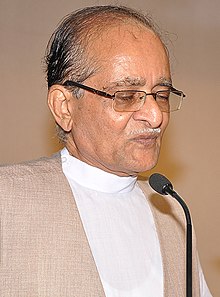Kumudini Lakhia is an Indian Kathak dancer and choreographer based in Ahmedabad, Gujarat, where she founded Kadamb School of Dance and Music, an institute of Indian dance and music in 1967.
Ramanlal C. Mehta was an Indian musician and musicologist. In 2009, he was awarded the Padma Bhushan, India's third-highest civilian honour.

Sarita Joshi is an Indian actress. Cited amongst the finest and most significant actors of Gujarati and Marathi theatre, Joshi is known for her Gujarati plays done with her husband Pravin Joshi in the 1970s. She garnered widespread recognition for her role as the matriarch Godavari Thakkar in the Star Plus hit dramedy Baa Bahoo Aur Baby (2005-2010). In 1988, she was awarded the Sangeet Natak Akademi Award for Acting in Gujarati by the Sangeet Natak Akademi, India's National Academy of Music, Dance & Drama. In 2020, she has been awarded with Padma Shri, India's fourth highest civilian award for her contribution in Art. She was recently seen in (2019) Zee TV's Hamari Bahu Silk as a hard-working business woman who hates films especially 'A' grade films. Sarita Joshi is currently seen on Anupama: Namaste America a prequel web series to Star Plus show Anupamaa.

Kumarpal Balabhai Desai is an author, critic, editor, journalist, columnist and translator from Gujarat, India. He studied and later taught at the Gujarat University. He is associated with several social and Gujarati literary organisations such as Gujarati Sahitya Parishad. He has written and edited more than hundred books including biographies and several works on Jainism. He was awarded the Padma Shri in 2004.
Jyotindra Manshankar Bhatt, better known as Jyoti Bhatt, is an Indian artist best known for his modernist work in painting and printmaking and also his photographic documentation of rural Indian culture. He studied painting under N. S. Bendre and K.G. Subramanyan at the Faculty of Fine Arts, Maharaja Sayajirao University (M.S.U.), Baroda. Later he studied fresco and mural painting at Banasthali Vidyapith in Rajasthan, and in the early 1960s went on to study at the Academia di Belle Arti in Naples, Italy, as well the Pratt Institute in New York. He was awarded the Padma Shri in 2019 and elected as a Fellow of the Lalit Kala Akademi in 2022.
Haku Vajubhai Shah was an Indian painter, Gandhian, cultural anthropologist and author on folk and tribal art and culture. His art belonged to the Baroda Group and his works are considered in the line of artists who brought themes of folk or tribal art to Indian art.

Chandravadan Chimanlal Mehta, popularly known as C. C. Mehta or Chan. Chi. Mehta, was a Gujarati playwright, theatre critic, bibliographer, poet, story writer, autobiographer, travel writer and broadcaster from Vadodara, Gujarat, India.
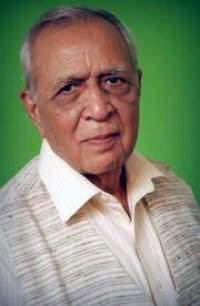
Bholabhai Patel was an Indian Gujarati author. He taught numerous languages at Gujarat University and did comparative studies of literature in different languages. He translated extensively and wrote essays and travelogues. He was awarded the Padma Shri in 2008.
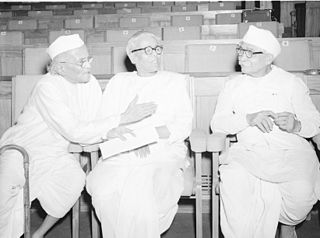
Jaishankar Bhudhardas Bhojak, better known by his theatre name Jaishankar Sundari , was an Indian actor and director of Gujarati theatre. Starting at the young age, he rose to fame for his roles of female impersonator in early Gujarati plays. He retired from acting in 1932 but returned to theatre direction and teaching in 1948. He directed and acted in several successful plays. He was awarded the Ranjitram Suvarna Chandrak in 1951 and the Padma Vibhushan in 1971.

Pravin Darji is Gujarati essayist, poet, critic and editor from India. He was awarded Padma Shri in 2011.
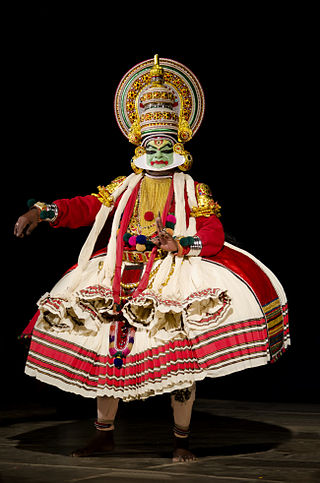
Kavungal Chathunni Panicker (1922-2007) was an Indian classical dancer, known for his proficiency in Kathakali, the traditional dance form of Kerala. He was an exponent of the Kavungal School of Kathakali, noted for its rigorous training methods and overt physical interpretation of abhinaya. He is known to have brought innovations to the dance form, especially in the decorative movements (kalasam) and his contributions are reported in the development of grammar and costumes for the Kavungal School. A recipient of the Sangeet Natak Akademi Award in 1973, Panicker was honored again by the Government of India, in 2006, with the fourth highest Indian civilian award of Padma Shri.
Sonam Tshering Lepcha was an Indian folk musician, composer and lyricist. He was the first among Lepcha people to air his voice on All India Radio and was credited with the revival of Lepcha culture, one of the indigenous cultures of the Indian state of Sikkim. He was reported to be credited with over 400 folk songs, 102 folk dances and 10 dance dramas. He died on 30 July, 2020 due to cardiac arrest.

Bhikhudan Govindbhai Gadhvi is an Indian folk singer and songwriter, known as a proponent of Dayro, a narrative singing tradition of Gujarat. He is a recipient of the Gujarat Gaurav Award of the Government of Gujarat and the Sangeet Natak Akademi Award. The Government of India awarded him the fourth highest civilian honour of the Padma Shri, in 2016, for his contributions to folk music.
Rasiklal Chhotalal Parikh (1897–1982) was a 20th-century Gujarati poet, playwright, literary critic, Indologist, historian, and editor from Gujarat, India. He was the president of Gujarat Sahitya Sabha and was appointed the president of Gujarati Sahitya Parishad in 1964. He received the Sahitya Akademi Award in 1960 for his play Sharvilak. He is also a recipient of the Ranjitram Suvarna Chandrak and the Narmad Suvarna Chandrak.
Pransukh Manilal Nayak was an Indian Gujarati theatre actor, director, manager, and playwright from Gujarat, India. Born into a family of traditional theatre actors, he joined theatre troupes at a young age and rose to fame for his comic roles and female impersonations. His performances as a woman from Banaras in Kumali Kali and as Jivram Bhatt in Mithyabhiman were acclaimed. During his long career, he worked with many theatre companies and gave 22,455 performances, earning a listing in the 1989 Guinness Book of Records.
Muljibhai Khushalbhai Nayak (1892–1971) was a Gujarati theatre director and actor from Gujarat, India. He was well known for his heroic and Bhavai roles.

Mukund Nayak, is an Indian artist. He is a folk singer, songwriter and dancer. Nayak is an exponent of Nagpuri folk dance Jhumar. He is recipient of the Padma Shri and Sangeet Natak Akademi Award.

Hasmukhray Vrajlal Yajnik, better known as Hasu Yajnik, also spelled Hasu Yagnik was an Indian Gujarati language novelist, short story writer, critic, editor, folklorist and children's writer. Born and educated in Rajkot, he served as a professor of Gujarati in various government colleges in Gujarat. He had written twenty novels, three short story collections, two jail stories, four medieval story collections, criticism of four medieval works, and edited twelve folk works and six works of children's literature.

Mahesh Champaklal is an Indian dramatist, stage actor and director from Gujarat, India. After working for some years in the commercial Gujarati theatre, he joined and taught dramatics at the Maharaja Sayajirao University of Baroda.
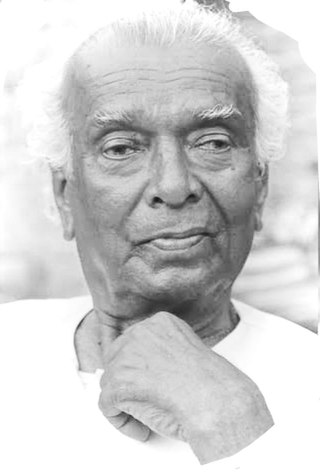
Ramchandra Manjhi was an Indian Bhojpuri folk dancer and theatre artist who is famous as a Launda Naach performer. He was one of the members of Bhikhari Thakur's drama team and was awarded the Sangeet Natak Akademi Award in 2017 and was awarded India's fourth highest civilian award the Padma Shri in 2021.
